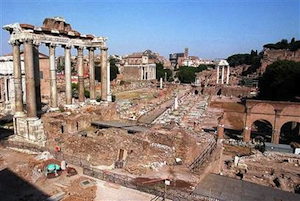Why tax cuts and limited government kill
 As a multiethnic, continental superpower, the U.S. is inevitably compared to (and compares itself to) imperial Rome. Look at the monumental marble buildings of Washington DC or in every major city – like New York’s old Penn Station station, designed to imitate the Baths of Caracalla. And don’t forget the Latin script on our money.
As a multiethnic, continental superpower, the U.S. is inevitably compared to (and compares itself to) imperial Rome. Look at the monumental marble buildings of Washington DC or in every major city – like New York’s old Penn Station station, designed to imitate the Baths of Caracalla. And don’t forget the Latin script on our money.
And inevitably, whenever things are going badly in the U.S., people try to draw parallels to the “fall” of Rome. But most people don’t understand what really happened to Rome, or even why or when. New scholarship recreates a very different picture – one that is far more relevant to America’s crisis today than the old myth.
In short, decline came to Rome and is coming to the U.S. due to a lack of taxes, limited government, and a loss of caring.
OK, let’s explain.
Modern historians have given a fresh, more skeptical read to the literature from late Rome and the early “Dark Ages” and combined it with new archeology to show that the “fall” was in fact a very gradual decline that took centuries. Rome ended with a prolonged whimper, not a bang. That’s instructive for the US, which faces no significant military threat or zombie apocalypse but is, regardless, steadily running downhill.
Fascinating new books by Peter Heather (with the unfascinating title “The Fall of Rome”) and by Chris Wikham (The Inheritance of Rome) show what really happened. The so-called “barbarians” didn’t destroy Rome, they mismanaged it.
Unlike the grand proclamations of Edward Gibbon in The History of the Decline and Fall of the Roman Empire, the realm did not die from internal moral rot or the anti-intellectual, do-nothing attitude of Christianity. It died due to bad political and fiscal decisions.
Rather than making peace with the Goths, who were great Romanophiles anxious to join the Empire, Roman leaders undertook a massive genocide effort that failed miserably. The Goths kicked their butts because they were great warriors (after all, their leaders had served in the Roman army). And pulling too many troops to the border with the Persian Empire left the Rhine poorly guarded and allowed the Germans to easily cross over.
Rome forestalled its demise by about a hundred years, however, simply by raising taxes to fund a stronger military.
But the “fall” wasn’t so bad. Rome was gradually taken over by Germans who generally loved Roman culture and wanted to continue it. Their leaders often spoke fluent Latin, had proper Roman educations and had lived in the Empire (many serving in the military).
They very much saw themselves as inheritors and protectors of the culture, not as destroyers. Theodoric the Ostragoth, King of Italy, occupied the administrative capital, Ravenna, and continued to build churches and other buildings in the Roman style. He also spent several months in the imperial palace in Rome, presiding over chariot races and other traditional Roman festivities.
But the Germans had horrible fiscal policies. Most of all, they had no appetite for taxation, and gradually gave up on collecting most revenue. No money, no empire. The successor states couldn’t maintain infrastructure (the famous Roman roads and bridges), they couldn’t provide safe passage for merchants or regulate commerce, and their economies retracted – a lot.
Fast forward to the present Rome. Despite all the Tea Party ranting, taxes, as a percentage of GDP, haven’t been this low since the 1950s. The wealthiest people and companies pay a far smaller percentage than the poor folks.
And what do you know, the infrastructure is falling apart. NOAA weather satellites will soon fall from the sky (so much for tracking hurricanes), teachers in state-run schools are soliciting donations so they can continue to do their jobs. And tens of thousands of bridges are about to collapse.
This contrasts with the absurd wealth and flagrant spending of the wealthy. CEOs earn more than their entire corporations pay in taxes. Extreme luxury spending (think Swiss watches) is soaring. And some Internet firms are way overvalued.
In the post-Roman world, the rich didn’t go away. Landowners built castles, and church officials lived like royalty (in face, bishops were called princes of the church).
Meanwhile, bandits ruled the roads, regular folks were reduced to serfdom, and the Dark Ages reigned for 800 years.
Would be a shame if the U.S. continues down the same path as post-Roman, Medieval Europe.
(image: BBC)
